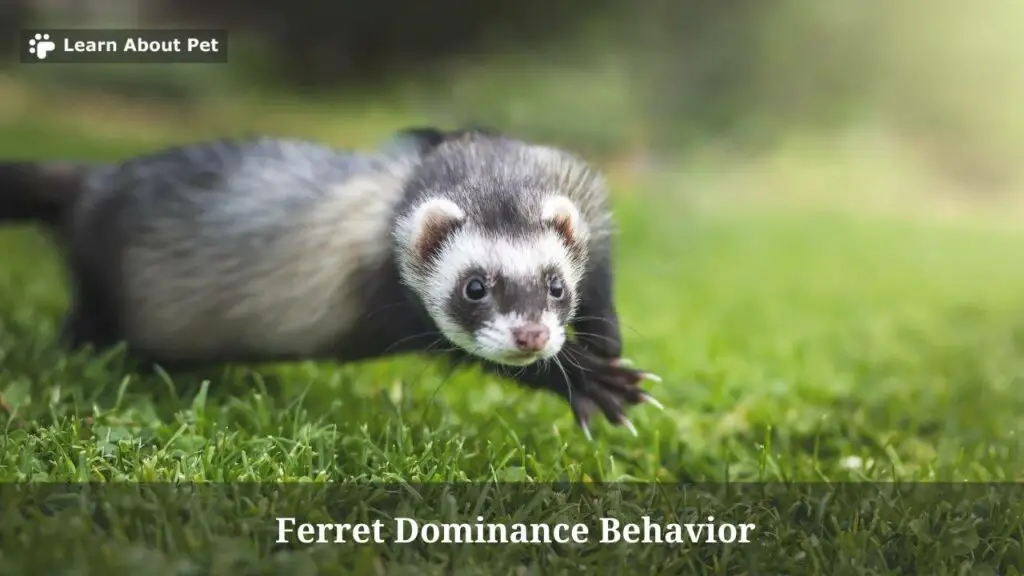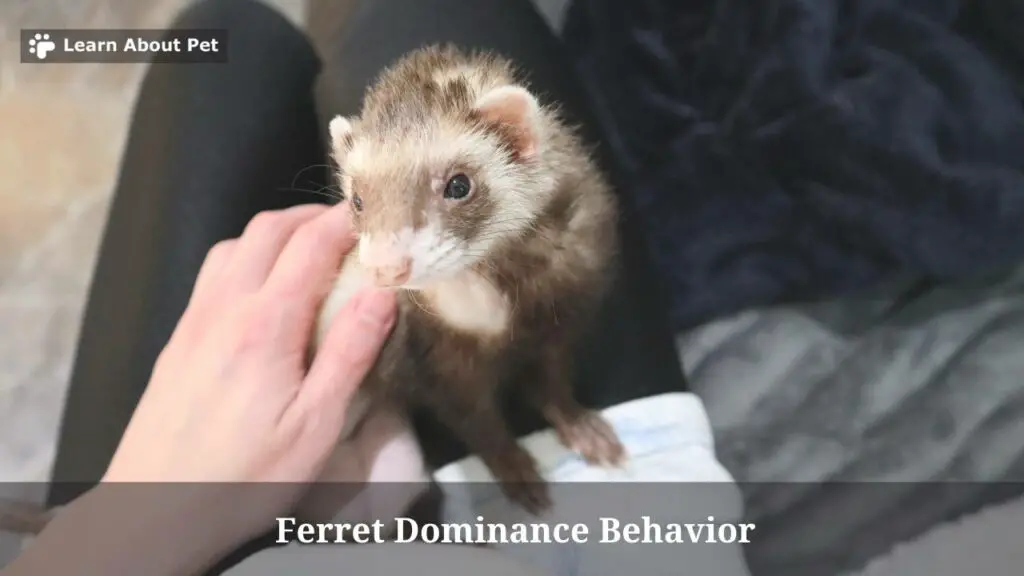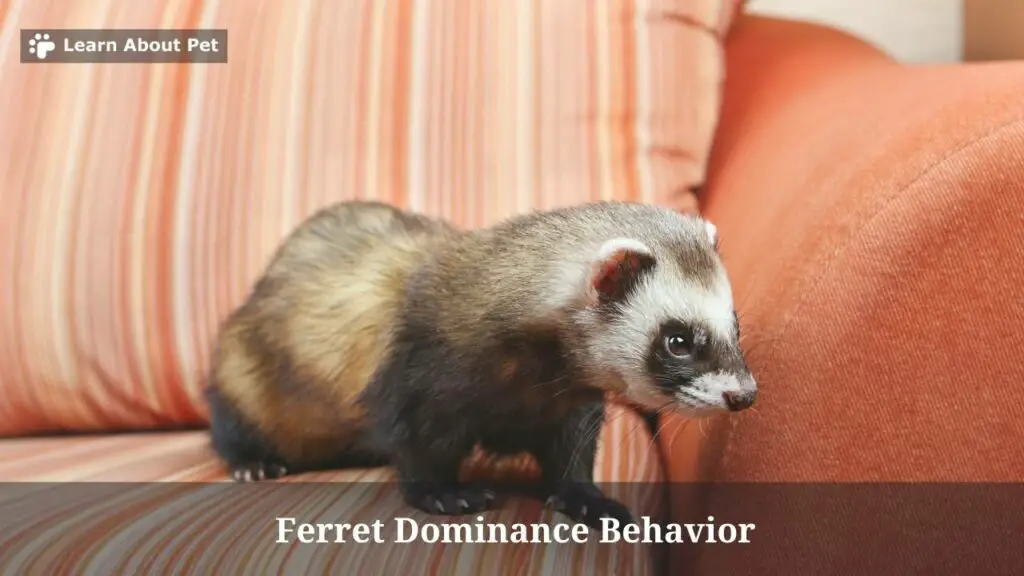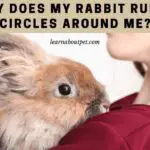If you keep more than one ferret, there may come a time when one of the ferrets tries to assert itself as being dominant over the other(s). This would give rise to ferret dominant behaviors. In this article, you will find information on the dominance behaviors in ferrets and how to manage them.
Ferret dominance behavior is aimed at asserting superiority (or alpha status) over other ferrets. It is normally aggressive behavior, in which the ferret that wants to be recognized as the alpha may grab the other by the neck and flip over or drag them around.
Naturally, upon noticing this sort of behavior, you will start wondering, why is my ferret aggressive? And how do I stop my ferret being dominant?

But before you get to this point, you may encounter a challenge telling whether the ferrets are playing or fighting. Indeed, that question (on how can you tell if ferrets are fighting or playing) is very common in ferret forums.
So the underlying concern is on how do I know if my ferret is aggressive or just playful?
There can also be a challenge in making the distinction between dominance or adrenal aggression in ferrets. Signs of aggression in ferrets seem to be the same: whether it is dominance or adrenal aggression.
Therefore before going further, it would be important for us to have some insight into typical ferret dominance behaviors.
What Is Typical Ferret Dominance Behavior?
Typical dominance behavior in ferrets has two key features: it is ‘bossy’ and aggressive.
Remember, the ferret that wants to be viewed as ‘dominant’ is trying to prove that he or she is superior. To this end, he or she has to use bossy and aggressive behaviors.
Therefore the ferret may tend to start fighting the others, and showing savage aggression. So you end up with aggressive ferret behavior to other ferrets.
Sometimes, the behavior has a sudden onset. And that gets you wondering, why is my ferret suddenly aggressive to the others? Or why is my ferret becoming aggressive to the others?
At this point, one may ask, how do ferrets show dominance? And the answer is that they mainly do so through the so-called ferret dominance fighting.
So the whole thing revolves around aggression. This leads to another question – on how to tell if a ferret is aggressive.
An aggressive ferret will keep on attacking other ferrets. You see a pattern in which the ferret that is seeking to be dominant keeps on attacking other ferrets, with a view to eventually emerge as the ‘top boss’.
So the objective is to ultimately elicit submissive behavior in ferrets. That is what the aspiring dominant ferret aims at.

You often find that the ferrets keep biting and dragging each other, in a bid to assert dominance.
Sometimes, it is new ferret dominance or socially inept ferrets being dominated by others with better social skills.
It is often different from territorial aggression. The latter may come up when, for instance, introducing a new ferret to a previous loner. But dominance behavior’s aggression is different: aimed at showing who is the ‘boss’.
Why Do Ferrets Engage In Dominance Behavior?
Ferrets are social animals. They live in groups. Just like other social animals, they often feel the need to establish hierarchies. The hierarchies are established through the dominance behavior.
So the ferrets engage in dominance behavior in order to establish pecking orders.
The ferrets that become dominant have better access to resources. They also have higher chances at reproduction. That is why the ferrets do all they can to emerge dominant.
Are male ferrets more aggressive? Ironically, the males seem (in most cases) to be more laid back than the females. So it is from the females that we seem to get more aggression.
What Should You Do About Dominance Behavior In Ferrets?
If the fighting is too intense, you may need to separate the ferrets.
You therefore need to know how to break up dominance fights between ferrets. And the key thing there is to separate them. In doing so, you need to wear thick gloves, lest you be bitten.
How can you discipline an aggressive ferret? This is mainly by using the time-out method. The time-out method usually works quite well, at getting the ferret to know that the behavior is unwanted, and thus desist from it.
Final Verdict – Ferret Dominance Behavior
Ferrets are social animals. Therefore they live in groups. And in those groups, a need tends to arise for some sort of social hierarchy to be established. That is established through the use of dominance behaviors.
Normally one ferret in a group (even in a ‘group’ of two ferrets) will want to be regarded as the dominant one. To achieve this goal, it exhibits dominance behaviors.

The dominance behaviors largely revolve around aggression. Thus the ferret that wants to be regarded as dominant will tend to be savagely aggressive to the other(s).
If you find particularly brutal ferret dominance fights, it may be a good idea to separate the fighting ferrets. In doing this, you need to use hands with thick gloves. Otherwise you too may become a victim: by way of being bitten.
As a pet lover, make sure to learn about pet more and give your pet ferret a good and comfortable life!

Welcome to Learn About Pet. My name is Rajkumar Ravichandran and I love all pets, travel, and amazing food. I write about my passion and personal experience caring for multiple pets in this blog! ❤️
Post Disclaimer
DISCLAIMER: THIS BLOG OR WEBSITE, "Learn About Pet", DOES NOT PROVIDE YOU WITH MEDICAL ADVICE AND IS NOT A SUBSTITUTE FOR MEDICAL ADVICE. ALWAYS GET IN TOUCH WITH YOUR PERSONAL VETERINARIAN AND USE INFORMATION HERE AS GENERAL ADVICE.
The information, including but not limited to, text, graphics, images and other material contained on this website are for informational purposes only. No material on this site is intended to be a substitute for professional veterinary advice, food recommendation, diagnosis, or treatment. Always seek the advice of your veterinarian or other qualified health care provider with any questions you may have regarding a medical condition or for pet food related questions.







